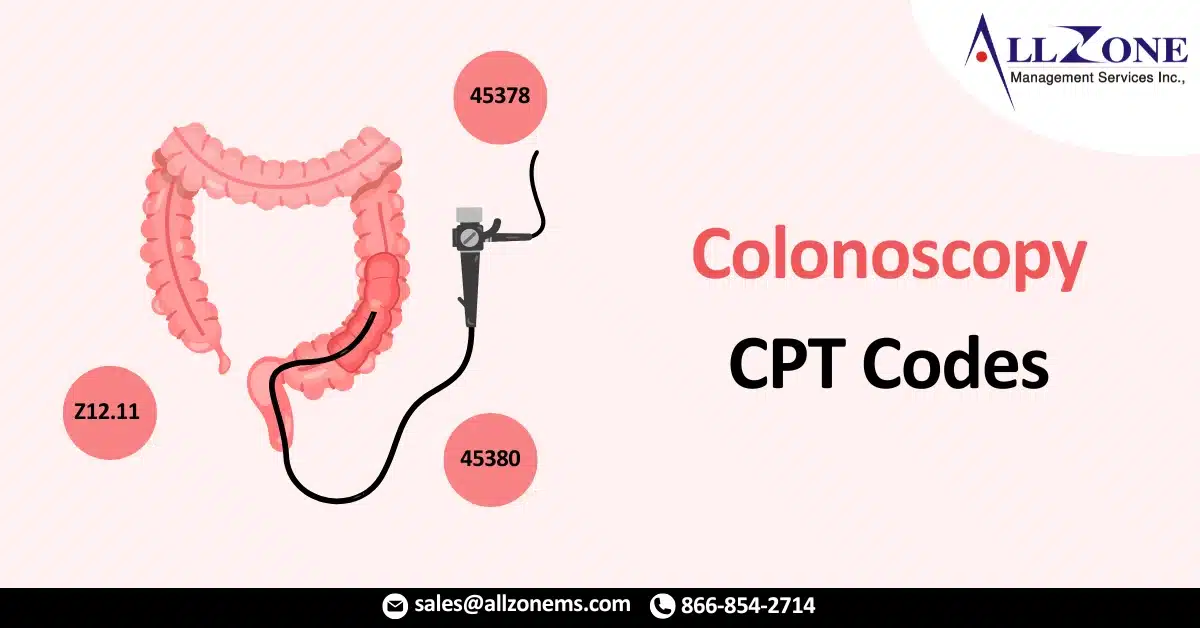In the world of medical billing and coding, proper documentation and coding of procedures is essential for timely reimbursements and compliance. One such critical procedure is the colonoscopy, a diagnostic and preventive test widely used in the detection of colorectal conditions such as cancer, polyps, inflammatory bowel disease, and more. To ensure accurate reimbursement and documentation, Current Procedural Terminology (CPT) codes must be applied correctly depending on the type of colonoscopy performed.
In this comprehensive blog, we will explore everything healthcare providers and medical coders need to know about colonoscopy CPT codes, including the different types, when to use each code, applicable modifiers, and billing guidelines.
What is a Colonoscopy?
A colonoscopy is a minimally invasive endoscopic procedure that allows physicians to examine the interior lining of the colon (large intestine) and rectum using a flexible tube with a camera. Colonoscopies are essential for early detection of colorectal cancer and for diagnosing gastrointestinal symptoms like bleeding, abdominal pain, or chronic diarrhea.
Depending on the intent and findings, colonoscopies may be categorized into:
- Screening Colonoscopies – performed on asymptomatic patients for preventive care
- Diagnostic Colonoscopies – performed when the patient exhibits symptoms
- Surveillance Colonoscopies – follow-up procedures for patients with a history of polyps or cancer
Each category has specific CPT codes, ICD-10 diagnosis codes, and modifier rules that impact billing outcomes.
Commonly Used Colonoscopy CPT Codes
Here is a breakdown of the most frequently used colonoscopy CPT codes categorized by purpose and procedures performed:
1. Screening Colonoscopy CPT Codes
These codes apply to patients undergoing routine preventive screenings with no symptoms.
- 45378 – Colonoscopy, flexible, diagnostic, including collection of specimen(s) by brushing or washing, when performed.
This is often the base code and may be used as a screening colonoscopy when no biopsy or polyp removal is performed.
- G0121 – Screening colonoscopy for average-risk individuals (used by Medicare)
- G0105 – Screening colonoscopy for high-risk individuals (used by Medicare)
Note: For Medicare, the G-codes replace 45378 when the intent is preventive.
2. Diagnostic and Therapeutic Colonoscopy CPT Codes
When a patient shows symptoms, diagnostic or therapeutic colonoscopy codes are used:
- 45379 – Colonoscopy with removal of foreign body
- 45380 – Colonoscopy with biopsy, single or multiple
- 45381 – Colonoscopy with submucosal injection (e.g., saline, ink)
- 45382 – Colonoscopy with control of bleeding
- 45383 – Colonoscopy with ablation of tumor(s), polyp(s), or other lesions
- 45384 – Colonoscopy with removal of tumor(s), polyp(s), or other lesion(s) by hot biopsy forceps
- 45385 – Colonoscopy with removal of tumor(s), polyp(s), or other lesion(s) by snare technique
Modifier Use in Colonoscopy Coding
Modifiers are crucial in determining how the payer processes the claim. Here are some commonly used modifiers with colonoscopy CPT codes:
- Modifier 33 – Preventive services (used to indicate a preventive screening colonoscopy that transitioned to therapeutic)
- Modifier 52 – Reduced services
- Modifier 53 – Discontinued procedure
- Modifier PT – Used for Medicare to indicate a screening colonoscopy that became diagnostic or therapeutic due to findings
Example:
If a screening colonoscopy (G0121) turns therapeutic (e.g., a polyp is removed), you would bill:
- 45385 with Modifier 33
- For Medicare, add Modifier PT
ICD-10 Codes for Colonoscopy
Correct diagnosis coding supports the medical necessity of the procedure. Examples include:
- 11 – Encounter for screening for malignant neoplasm of colon
- 010 – Personal history of colonic polyps
- 5 – Polyp of colon
- 5 – Other fecal abnormalities
For preventive screenings, Z12.11 is typically used. If findings occur, secondary diagnosis codes may be added to reflect the outcome.
Medicare vs. Commercial Insurance Guidelines
Billing rules may differ between Medicare and commercial payers. Here’s a quick comparison:
| Aspect | Medicare | Commercial Insurance |
| Screening Codes | G0121, G0105 | 45378 + Modifier 33 |
| Modifier for Findings | PT | 33 |
| Frequency Limits | Every 10 years (average risk) | Varies by plan |
| High-Risk Screening | Every 2 years | Plan-dependent |
Understanding payer-specific requirements ensures fewer denials and maximizes reimbursement.
Coding Tips and Best Practices
- Verify Patient Eligibility: Confirm whether the colonoscopy is preventive, diagnostic, or follow-up. This determines the CPT and ICD-10 code combinations.
- Accurate Documentation: Ensure that the provider clearly states the intent of the colonoscopy (screening vs. diagnostic) and any interventions performed.
- Use Modifiers Correctly: Applying the correct modifiers like 33 and PT prevents unnecessary claim rejections or cost-sharing by the patient.
- Check Payer Policies: Policies may vary, especially for Medicare Advantage and commercial payers. Always refer to payer-specific colonoscopy billing guides.
- Watch for Frequency Edits: Colonoscopies are subject to frequency limits; billing too soon may result in denial unless medical necessity is established.
- Include All Findings: If multiple procedures are performed (e.g., biopsy and polyp removal), ensure the correct CPT combination is reported.
Common Billing Scenarios
Scenario 1: Screening Colonoscopy with No Findings
- CPT Code: 45378
- Modifier: 33
- ICD-10: Z12.11
Scenario 2: Screening Colonoscopy, Polyp Removed via Snare
- CPT Code: 45385
- Modifier: 33
- ICD-10: Z12.11, K63.5
Scenario 3: Medicare Patient, Polyp Removed During Screening
- CPT Code: 45385
- Modifiers: PT
- ICD-10: Z12.11, K63.5
Final Thoughts
Colonoscopy coding can be complex due to the various factors involved—screening vs. diagnostic, Medicare vs. private payers, and whether a therapeutic procedure was performed. Using the correct colonoscopy CPT codes, diagnosis codes, and modifiers is key to successful claims processing and ensuring patients receive the benefits they are entitled to.
Medical coders, billers, and providers must stay updated with CMS and payer-specific guidelines to reduce denials and improve compliance.
Need Help with Colonoscopy Billing and Coding?
At Allzone Management Services, our certified coding experts ensure precise colonoscopy billing and coding, error-free billing, and faster reimbursements. Let us help you streamline your revenue cycle today.
📞 Contact us to learn more about our medical billing services.

